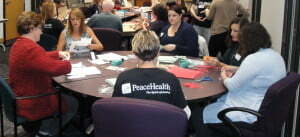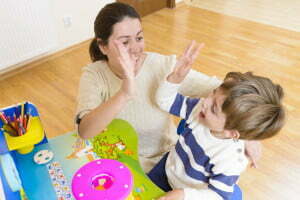Quarrels, meltdowns, and hurt feelings are all too common when children play together. Maybe you have even noticed your own child being bossy while playing with friends. While this might be worrisome to us as caregivers, this type of “self-centered” behavior is actually developmentally appropriate for young children. Their brains are wired to focus on their own wants and needs. They are still developing the ability to understand that people have different thoughts and feelings than they do. By teaching our children what it means to respect others we can help guide them in becoming thoughtful and kind friends to their peers.
Start by defining what respect means– Respect means that we care about what other people are feeling and those feelings are important to us. We can show respect by being friendly, listening to what our friends have to say, sharing and taking turns.
Have a conversation with your child about what respect means to them. Ask if they remember a time when someone showed them respect, like sharing their favorite toy with them when they were sad or letting them go first while playing a game. Have there been times when friends didn’t show respect, like being bossy or unkind? Ask your child how that made them feel.
Practice with your child- It can be really helpful (and fun) to role play situations with your child to practice showing respect. During a car ride you could ask them what they might do in different situations, like “what if you are running around with your friend and they trip and fall, what could you do to help them?” or “while coloring, your friend asks you for the pink marker you’re using, what could you say to them?”
Pre-teach your child– Before a play date, have a quick conversation about how showing respect might look or sound. Remind them that they can do things like letting friends choose the game, letting others go first, using kind words, and noticing how others might be feeling. Remind them of how great it feels when friends show us respect and kindness!
Notice when your child is respecting others- Label those instances and appreciate their effort!
“When you accidentally knocked over your brother’s tower you noticed he was sad and you helped him make a new one! That was so respectful and friendly!”
Teaching our children important social skills that will help them get along with peers can sometimes feel difficult. Using the steps outlined above is a helpful way to break down any skill that you want to teach your child. Start by defining what it means, give your child an opportunity to practice it, remind them of the skill before an opportunity to use it comes up. And most importantly take time to notice and label when ever you see them use the skill!





